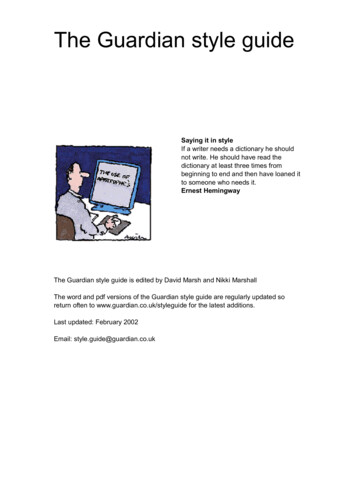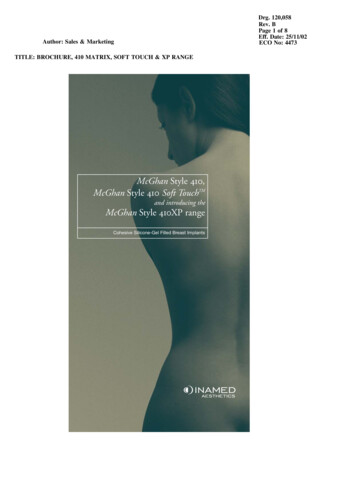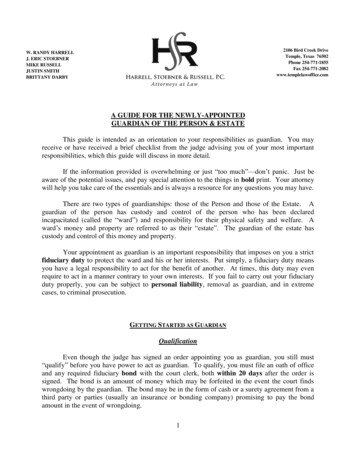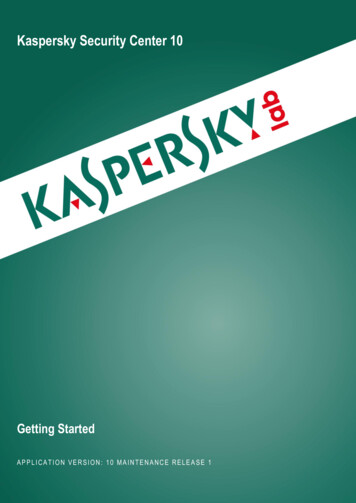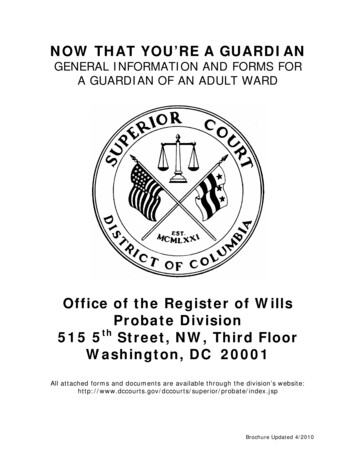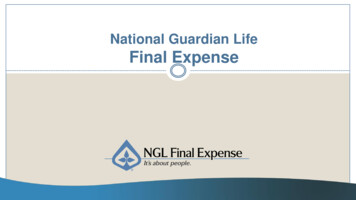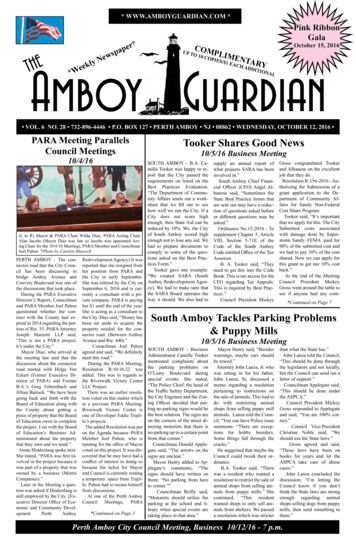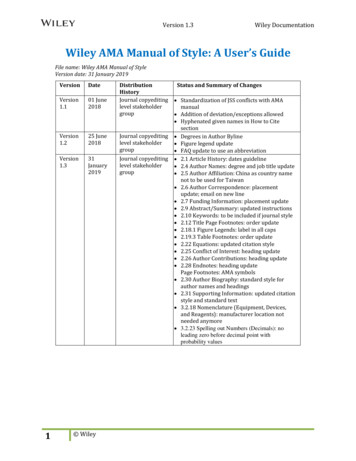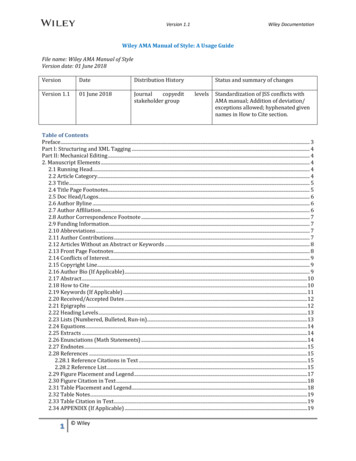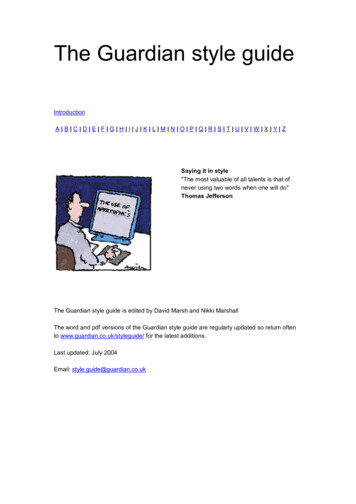
Transcription
The Guardian style guideIntroductionA B C D E F G H I J K L M N O P Q R S T U V W X Y ZSaying it in style"The most valuable of all talents is that ofnever using two words when one will do"Thomas JeffersonThe Guardian style guide is edited by David Marsh and Nikki MarshallThe word and pdf versions of the Guardian style guide are regularly updated so return oftento www.guardian.co.uk/styleguide/ for the latest additions.Last updated: July 2004Email: style.guide@guardian.co.uk
TheGuardian style guideNeither pedantic nor wild an introduction by Michael McNayThe Guardian has always been a newspaper for writers, and so anewspaper for readers. All the other skills, copy editing, design,typography, illustration, photography, are there to enhance the writingand to make it more accessible, to make the paper a more desirablejournal to read - though illustration and photography each has itsseparate justification as well.(Collins EnglishDictionaryMillennium Edition)to which you shouldrefer for for guidanceon anything that doesnot appear in thestyle guideIt should not be necessary to add that Guardian writers andsubeditors should all be interested in the language, in its proper useand its development, and that regular trips to books as wide-rangingas Gower's The Complete Plain Words, Partridge's Usage andAbusage, Orwell's brilliant short essay Politics and the EnglishLanguage, Fowler's Modern English Usage, or Kingsley Amis's TheKing's English, are useful in sharpening professional tools as well asfor entertainment.One says it should not be necessary, but it is very obvious all roundthe Guardian office that uncomfortably many people involved inproducing and shaping text for the paper rely more on the casualquestion, "What's the style for x?" and the casual answer, "I think it'sprobably y." Journalists who are not sufficiently interested in housestyle to check the house style guide are not on the face of it verylikely to be much interested in style at all.But our approach to style in its broadest sense is, if anything, moreimportant now than before, first because other newspapers, whichmay always have had good writing in specialist areas, have caughtup fast across a whole range of news and features; second becausethe Guardian itself employs so many staff on freelance shifts or shortcontracts who arrive here with no particular idea of what makes thispaper different from others, and even staff journalists who are neverinducted into what values the Guardian holds particularly close; third,though more obscurely, because of the arrival of the internet: thisstyle guide itself is the first to be published on the world wide web.That makes it accessible in seconds; it cannot get lost or sufferhaving coffee spilt on it. But though there is no reason in itself whynew publishing methods should change the language for the worse,the example of radio and television shows that it can: at the top end,the best correspondents file spoken reports that could grace thisnewspaper; at the broad base, reporters speak a form of unlovely butinfectious journalese destined only for the rubbish bin.House style is the means by which a newspaper seeks to ensure thatwhere there are permissible variants in spellings, the use ofacronyms and so forth, a unified approach to these matters is Guardian Newspapers Limited
TheGuardian style guideadopted to help in disseminating a sense of rationality and authorityin the use of language. What it does not mean is imposing a unifiedwriting style on the newspaper. Many of the reporters, columnists,critics and at least one former editor who once ran a highlyidiosyncratic gossip column and who have enlivened the pages ofthe Guardian and helped to build its international reputation couldhardly have done so had they been edited from the beginning into ahomogenous house style. A subeditor can do no worse disservice tothe text before him and thus to the writer, the reader, and thenewspaper, than to impose his or her own preferences for words, forthe shape of sentences and how they link, for a pedantic insistenceon grammar in all cases as it used to be taught in school; in theprocess destroying nuances and possibly even the flow of a piece.And I write this as a career copy and layout editor with the best partof 40 years' service on the Guardian and who regards the skillsinvolved in copy editing not just as desirable but essential.Editing involves fine judgment, particularly as the paper has so manysections today serving possibly quite different kinds of readership.But fine judgments mean good editing, blanket judgments mean badediting. A piece written in the vernacular that would be inappropriateon the analysis page or even (even?) in a sports column might passmuster in the Guide, where the demotic language of an NME reviewwould be closer to the mark than the high style of Macaulay or CPScott. And dealing sympathetically with quirks of writing stylecertainly does not preclude tidying up cliche-ridden journalese,verbosity, the latest vogue words and phrases, the words andphrases that flatten out meaning, replace a range of better morefinely tuned words and concepts, and anaesthetise writing.The introduction to the Guardian stylebook of 1960, which itself wasa revision to the initial guide published in 1928, was headed "Neitherpedantic nor wild".That much has not changed. Michael McNay worked for the Guardian from 1963 to 1999.A B C D E F G H I J K L M N O P Q R S T U V W X Y Z Guardian Newspapers Limited
TheGuardian style guideA B C D E F G H I J K L M N O P Q R S T U V W X Y Za or an before h?use an only if the h is silent: an hour, an heir, an honourable man, an honest woman; but ahero, a hotel, a historian (but don’t change a direct quote if the speaker says, for example, “anhistoric”)abattoirabbeyscap up, eg Rievaulx Abbey, Westminster AbbeyabbreviationsDo not use full points in abbreviations, or spaces between initials: BBC, US, mph, eg, 4am,lbw, No 10, PJ O'Rourke, WH Smith, etc.Spell out less well-known abbreviations on first mention; it is not necessary to spell out wellknown ones, such as EU, UN, US, BBC, CIA, FBI, CD, Aids, Nasa.Use all caps only if the abbreviation is pronounced as the individual letters; otherwise spellthe word out: the BBC, ICI, VAT, but Isa, Nato.Beware of overusing less well-known acronyms and abbreviations; they can look clunky andclutter up text, especially those explained in brackets but then only referred to once or twiceagain. It is usually simpler to use another word, or even to write out the name in full a secondtime.See contractionsAborigines, Aboriginalcap up when referring to native Australiansaborigines, aboriginallc when referring to indigenous populationsabscessabsorptionabysmalabyssa cappella Guardian Newspapers Limited
TheGuardian style guideAcasthe Advisory, Conciliation and Arbitration Service at first mention, thereafter just Acasaccentsuse on French, German, Spanish and Irish Gaelic words (but not anglicised French wordssuch as cafe, apart from exposé)Accentureformerly Andersen Consultingaccesshas been known as contact since the 1989 Children Actaccommodate, accommodationaccordionachilles heel, achilles tendonacknowledgmentnot acknowledgementacronymstake initial cap, eg Aids, Isa, Mori, Natoactuc when using full name, eg Criminal Justice Act 1998, Official Secrets Act; but lc on secondreference, eg “the act”, and when speaking in more general terms, eg “we need a radicalfreedom of information act"; bills remain lc until passed into lawactingalways lc:acting prime minister, acting committee chair, etcactormale and female, avoid actress except when in name of award, eg Oscar for best actress;one 27-year-old actor contacted the Guardian to say “actress” has acquired a faintlypejorative tinge and she wants people to call her actor (except for her agent who should callher often)AD, BCAD goes before the date (AD64), BC goes after (300BC); both go after the century, eg secondcentury AD, fourth century BCadaptationnot adaptionaddendumplural addendumsaddresses119 Farringdon Road, London EC1R 3ERAdidas Guardian Newspapers Limited
TheGuardian style guideinitial capadministrationthe Clinton administration, etcAdrenalinTM; a brand of adrenalineadrenalinehormone that increases heart rate and blood pressure, extracted from animals or synthesisedfor medical usesadverbsdo not use hyphens after adverbs ending in -ly, eg a hotly disputed penalty, a constantlyevolving newspaper, genetically modified food, etc; but hyphens are needed with short andcommon adverbs, eg ill-prepared report, hard-bitten hackadvisernot advisoradvocatemember of the Scottish bar (not a barrister)aeroplanenot airplaneaffect/effectexhortations in the style guide had no effect (noun) on the number of mistakes; the level ofmistakes was not affected (verb) by exhortations in the style guide; we hope to effect (verb)achange in thisaffinitywith or between, not to or forAfghanspeople Afghanis currency of Afghanistanaficionadoplural aficionadosAfrican-Caribbeannot ngages Guardian Newspapers Limited
TheGuardian style guideTony Blair, 52 (not “aged 52”); little Johnny, four; the woman was in her 20s (buttwentysomething, fortysomething)Aggravateto make worse, not to annoyaggrodespite the once popular terrace chant “A, G, A-G-R, A-G-R-O:Agro!”AGMahead ofavoid, use before or in advance ofaide-de-campplural aides-de-campaide-memoireplural aide-memoiresAidsacquired immune deficiency syndrome, but normally no need to spell outairbase, aircrew, airdrop, airlift, airmailaircraft carrierair raid, air strikeair vice-marshalal(note lc and hyphen) before an Arabic name means “the” so try to avoid writing “the al- ”where possibleAlastair or Alistair?Alastair Campbell, Alastair HetheringtonAlistair Cooke, Alistair Darling, Alistair Maclean, Alistair McGowanAleister CrowleyAlbright, Madeleineformer US secretary of state; Mrs Albright, not Ms, after first mentionAlcott, Louisa May(1832-88) American author of Little Womenwww.alcottweb.comA-levelsAli, Muhammadalibi Guardian Newspapers Limited
TheGuardian style guidebeing somewhere else; not synonymous with excusealice bandas worn by Alice in Lewis Carroll's Through the Looking-Glass (1871) and David BeckhamAllahArabic for “the God”. Both words refer to the same concept: there is no major differencebetween God in the Old Testament and Allah in Islam. Therefore it makes sense to talk about“God” in an Islamic context and to use “Allah” in quotations or for literary effectAllahu Akbar“God is most great”all comersAllende, IsabelChilean author, niece of Salvadorwww.isabelallende.comAllende, SalvadorChilean president, overthrown and killed in 1973allieslc, second world war allies, etc; but use coalition when referring to the 2003 Iraq warall mouth and trousersnot “all mouth and no trousers”, as has appeared in the paperallot, allottedall rightis right; alright is not all rightAll Souls CollegeOxford, no apostropheAlmodóvar, PedroSpanish film-makeralsatiandogAltaVistaalternativestrictly, a choice between two courses of action; if there are more than two, option or choicemay be preferredalumnusplural alumniAlzheimer's disease Guardian Newspapers Limited
TheGuardian style guideAM (assembly member)member of the Welsh assembly, eg Rhodri Morgan AMambassadorlc, eg the British ambassador to WashingtonAmerican Civil Liberties Unionnot American Civil Rights UnionAmerican universitiesTake care: “University of X" is not the same as “X University"; most states have two largepublic universities, eg University of Kentucky and Kentucky State University, University ofIllinois and Illinois State University, etcDo not call Johns Hopkins University “John Hopkins" or Stanford University “Stamford”America's CupAmhrán na bhFiannIrish national anthemAmicustrade union formed by a merger between the AEEU and MSFamidnot amidstamoknot amuckamongnot amongstamong or between?Contrary to popular myth, between is not limited to two parties. It is appropriate when therelationship is essentially reciprocal: fighting between the many peoples of Yugoslavia,treaties between European countries. Among belongs to distributive relationships: sharedamong, etcampersanduse in company names when the company does: Marks & Spencer, P&Oanaestheticanalysisplural analysesancestorsprecede descendants; we frequently manage to get them the wrong way roundAndalucíaannex Guardian Newspapers Limited
TheGuardian style guideverbannexenounanonymous pejorative quotesSee appendix 2: the editor’s guidelines on the identification of sourcesAnsaphoneTM; use answering machine or answerphoneantenna, antennae, antennasantenna (insect), plural antennae; antenna (radio), plural antennasanticipatetake action in expectation of; not synonymous with ti-semitic, anti-war but antisocialany moretwo wordsapexplural apexesapostrophesSome plural nouns have no “s”, eg children. These take an apostrophe and “s” in thepossessive, eg children's games, gentlemen's outfitter, old folk's home.The possessive in words and names ending in s normally takes an apostrophe followed by asecond s (Jones's, James's), but be guided by pronunciation and use the plural apostrophewhere it helps: Mephistopheles' rather than Mephistopheles's. Guardian Newspapers Limited
TheGuardian style guideUse apostrophes in phrases such as in two days’ time, 12 years' imprisonment and six weeks’holiday, where the time period (two days) modifies a noun (time), but not in nine monthspregnant or three weeks old, where the time period is adverbial (modifying an adjective suchas pregnant or old) — if in doubt, test with a singular such as one day’s time, one monthpregnant.And if anyone tries to tell you that apostrophes don’t matter and we’d be better off withoutthem, consider these four phrases (listed in Steven Pinker’s The Language Instinct), each ofwhich means something completel
The Guardian style guide is edited by David Marsh and Nikki Marshall The word and pdf versions of the Guardian style guide are regularly updated so return often to www.guardian.co.uk/styleguide/ for the latest additions. Last updated: July 2004 Email: style.guide@guardian.co.ukFile Size: 2MBPage Count: 185
